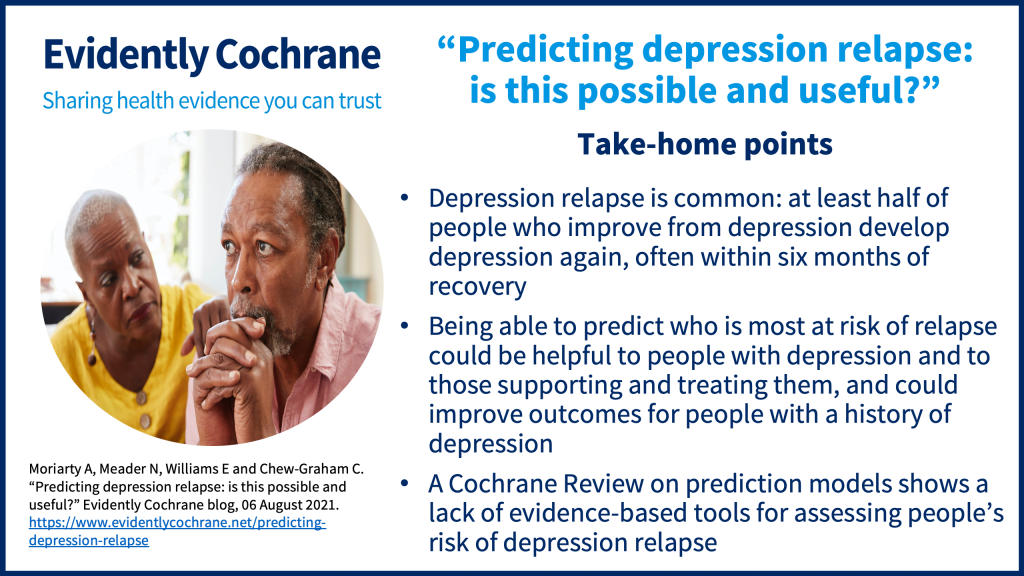In this blog for clinicians, researchers, people with depression and those supporting them, Andrew Moriarty (Academic GP), Nick Meader (Researcher), Emma Williams (Expert by experience) and Carolyn Chew-Graham (Professor of General Practice Research) look at the latest Cochrane evidence on predicting relapse of depression. Is predicting relapse possible, and likely to be useful to general practitioners (GPs) and patients?
Page last checked 11 July 2023

Why is depression relapse a problem?
Depression is now the leading cause of disability in the world (1). As well as the symptoms of depression itself, people with depression experience poorer quality of life, difficulties at work and, sometimes, difficulties undertaking normal day-to-day activities. Depression is a risk factorAn aspect of a person's condition, lifestyle or environment that affects the chance of them getting a disease. For example, cigarette smoking is a risk factor for lung cancer. for suicide.
After improving from an episode of depression, at least half of people will become unwell again (relapse), most within six months. Some people experience multiple recurrent episodes of depression throughout their life.
Relapse can sometimes be confused with withdrawal effects when coming off antidepressants, as discussed in a recent blog (2). This can sometimes result in people ending up back on antidepressants that they had been keen to stop taking. A better understanding of relapse may also address this problem.
The authors of this blog have seen first-hand or experienced how much depression relapse can impact a person’s life and are motivated to try to prevent this from occurring – to help people who get well to stay well. Most people who seek help for depression receive treatmentSomething done with the aim of improving health or relieving suffering. For example, medicines, surgery, psychological and physical therapies, diet and exercise changes. within primary care, and so primary care will be our focus of discussion in this blog.
How can depression relapse be prevented?
There are several different options to try to prevent a relapse from occurring. The best evidence that we have suggests that antidepressant medication, talking therapies, or a combination of the two reduce the riskA way of expressing the chance of an event taking place, expressed as the number of events divided by the total number of observations or people. It can be stated as ‘the chance of falling were one in four’ (1/4 = 25%). This measure is good no matter the incidence of events i.e. common or infrequent. of having a relapse (3,4). Other potential approaches are to improve and guide people’s ability to look after themselves and monitor their symptoms to look for early warning signs of a potential relapse.
The evidence for these approaches in a primary care (general practice) setting is lacking and most of the evidence we have comes from a secondary care (specialist) setting. The authors are currently undertaking two Cochrane ReviewsCochrane Reviews are systematic reviews. In systematic reviews we search for and summarize studies that answer a specific research question (e.g. is paracetamol effective and safe for treating back pain?). The studies are identified, assessed, and summarized by using a systematic and predefined approach. They inform recommendations for healthcare and research. aiming to improve the evidence base for relapse prevention in primary care and we look forward to sharing the results of these once we have them (5).
Why would predicting depression relapse be useful?
This brings us to the subject of prediction. Why would we want to be able to predict who will relapse? First, if we can identify those people at higher risk of relapse, then it might help us to know who is in need of treatments to prevent relapse. Others might be okay keeping an eye on their symptoms and seeking help if they need it. This theory would need testing to check that it works, but accurate prediction must come first.
Secondly, it might be that people at different levels of risk respond differently to different interventions. Giving different people different treatments based on their individual characteristics and level of risk is known as personalised medicine and is something that we are not yet able to do in this area.
Finally, information about level of relapse risk could be valuable information for people with depression and GPs. This may allow people with depression to make more informed choices about their longer-term care. Some people may not wish to know or discuss their risk of depression relapse and, as with any treatment plan, it would need to be discussed with the person at risk of relapse first.
What is the evidence for predicting depression relapse?
To answer the question of whether we can predict relapse, we recently published a Cochrane Review – one of the very first Cochrane Prognosis Reviews. We set out to review all of the existing prediction models attempting to predict relapse of depression (6).
Prediction models combine information about several different factors (like a person’s age, for example – or how bad their depression was and how many times they have had depression before). They then produce a risk, or probability, of the person having a particular outcomeOutcomes are measures of health (for example quality of life, pain, blood sugar levels) that can be used to assess the effectiveness and safety of a treatment or other intervention (for example a drug, surgery, or exercise). In research, the outcomes considered most important are ‘primary outcomes’ and those considered less important are ‘secondary outcomes’. (in this case, relapse).
Before setting out to do the review, we asked ourselves – if models do exist that predict well, why are they not already being used by doctors and other professionals to improve quality of life for patients?
In the review, we identified ten prediction models (from eleven relevant studies) for predicting depression relapse. Some of the models suggested that accurate prediction might be possible. However, an important part of any Cochrane Review is the assessment of risk of biasAny factor, recognised or not, that distorts the findings of a study. For example, reporting bias is a type of bias that occurs when researchers, or others (e.g. drug companies) choose not report or publish the results of a study, or do not provide full information about a study. (i.e. were there any issues in how the studies were carried out that mean we cannot fully trust the results?). In our review, the risk of bias was assessed as being high in all but one of the studies identified, so we can’t be very confident about their results. The studyAn investigation of a healthcare problem. There are different types of studies used to answer research questions, for example randomised controlled trials or observational studies. at low risk of bias, and therefore the only one we feel confident about, developed a model that predicted relapse poorly.
Therefore we cannot be confident in the results presented and we do not have the evidence to be sure about whether these models could be used in clinical practice. There is currently a lack of evidence-based tools (relapse prediction models) to allow us to estimate risk of relapse.
What is the way forward?
Individualised prediction of depression relapse could be hugely helpful, as it could help with a personalised approach to relapse prevention and longer term care of people with depression. We are now looking at ways to improve relapse prediction by developing a prediction model for GPs to use in primary care.
It seems to us that a prediction model would be most useful in primary care, to be used by GPs, because this is where the majority of people with depression are seen. However, it is possible that the kind of information that a GP has available does not allow accurate prediction and asking GPs to gather extra information may not be feasible in a time-limited consultation.
It might be that a depression relapse prediction model would be better situated within, for example, the NHS’s Improving Access to Psychological Therapies (IAPT) service, where patients have more structured follow-up and more detailed information is gathered. This, however, would mean that the prediction model was limited to fewer people.
Finally, if relapse cannot be predicted very well, then it may be that we need to find a way to offer all patients more support to prevent relapse, regardless of risk. This would mean rethinking our current approach and developing a way of realistically offering a greater number of patients useful and effective treatments. Either way – the staggering fact is that depression is the leading cause of disability worldwide and relapse contributes significantly to this. We think that the current situation is unacceptable and needs urgently addressing.
Discussing your risk of relapse with your GP
If you are keen to know more about how risk of depression relapse applies to your own situation, the best advice would be to start a conversation with your GP.
Because of the limited evidence we have described, the conversation is likely to focus on:
- the number of times you have had depression before
- how fully you have recovered
- what is happening in your life that might trigger a relapse.
We’re hoping that in future, better evidence will be available to make this more specific to you as an individual. However, having a conversation with your GP is a step to better understanding your own risk of depression relapse.
Read more:
- an interview with the lead authors of this review, Nick Meader and Andrew Moriarty
- a Cochrane Clinical Answer: “For adults with depression, can prognostic models predict relapse/recurrence of major depressive disorder?”
Nick, Andrew, Emma and Caroyln have nothing to disclose.
Andrew’s biography appears below. Read Nick’s, Emma’s and Carolyn’s.
Join in the conversation on Twitter with @CochraneUK or leave a comment on the blog.
Please note, we cannot give medical advice and do not publish comments that link to individual pages requesting donations or to commercial sites, or appear to endorse commercial products. We welcome diverse views and encourage discussion but we ask that comments are respectful and reserve the right to not publish any we consider offensive. Cochrane UK does not fact check – or endorse – readers’ comments, including any treatments mentioned.


